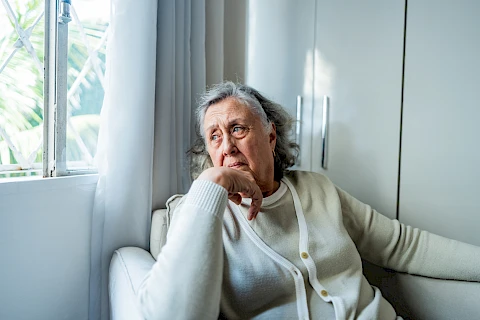
Seasonal transitions can bring unique challenges to senior health. Colder weather, shorter daylight hours, and changes in routine can impact their physical and emotional well-being. As a caregiver, supporting senior health in changing seasons means being mindful of these shifts and adapting care routines to address your loved one’s specific needs.
Seasonal Challenges in Older Adults
As weather and daylight patterns shift, seniors may experience physical and emotional challenges that require special attention.
Seasonal Affective Disorder (SAD)
Known as the winter blues, Seasonal Affective Disorder (SAD) is a type of depression that comes with the changing seasons. It usually starts in the fall and continues through winter. Symptoms include low energy, trouble sleeping, and a lack of interest in activities. SAD can be particularly tough for seniors, affecting their mental health and overall quality of life.
Changes in Appetite
The changing seasons can also impact eating habits and nutrition. Cooler weather may lead to a craving for comfort foods that are often high in fats and sugars, which can affect overall health. Seniors may also experience decreased appetite due to reduced physical activity or mood changes, making maintaining a balanced diet even more important.
Increased Fall Risks
Weather-related hazards like ice and snow increase fall risks during the colder months. For seniors who may struggle with decreased bone density or increased injury risk, a simple slip can lead to severe injuries. These hazards impact their mobility and overall safety, making it essential to take preventive measures.
Managing SAD in Older Adults
Social interaction can alleviate feelings of loneliness and isolation that often accompany SAD. Encourage seniors to participate in social activities such as community events or family gatherings. Even a simple phone call can make a big difference.
Another way to combat SAD is through light therapy. Special light boxes can mimic natural sunlight and improve mood. Sometimes, professional intervention is needed. Don't hesitate to seek mental health support for seniors if symptoms of SAD are severe. Therapists and counselors can offer coping strategies and treatments that are highly effective.
Maintaining Healthy Eating Habits
Incorporate seasonal fruits and vegetables into senior meals. Root vegetables like carrots and sweet potatoes are excellent choices in the fall and winter. Set regular meal times to maintain a routine and prevent seniors from skipping meals. Encourage seniors to drink water regularly, even if they don't feel thirsty. Herbal teas and broths can be good alternatives if plain water isn't appealing.
Preventing Falls and Ensuring Safety
Simple home modifications can go a long way in preventing falls. Keep walkways clear of clutter, install grab bars in the bathroom, and keep floors rug-free. Ensure seniors wear shoes with good grip when outdoors. Mobility aids like canes or walkers can also provide added stability so seniors can navigate their environment safely. Simple exercises like walking and stretching can improve balance and strengthen muscles, reducing the risk of falls. Just remember to consult with your loved one's care provider before starting a new exercise routine.
Senior Helpers Offers Additional Senior Support This Fall and Beyond
While seasonal changes can be challenging for seniors, proactive support can make a significant difference in maintaining their health and well-being. If you’re considering getting additional support for a loved one this fall, Senior Helpers Erie can help. We provide personalized home care services to seniors in Erie and Warren. Contact us today to learn more!